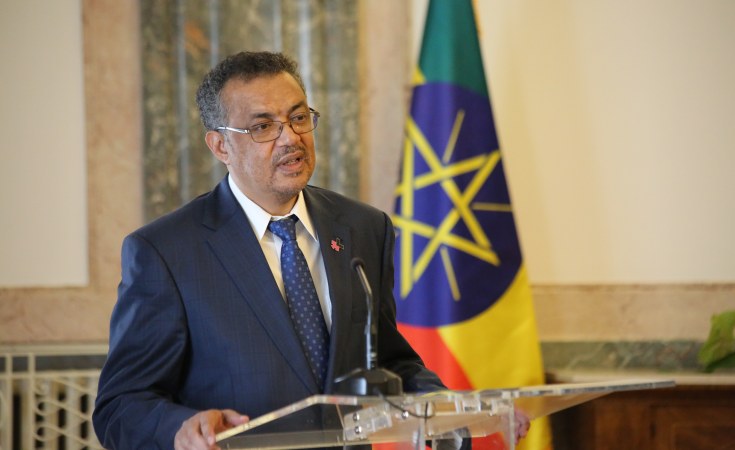Following intense criticism of its handling of the Ebola outbreak of 2014, the World Health Organization (WHO) has outlined institutional changes to address the shortcomings that led to a weak and ineffective response. While implementation is beginning under outgoing leader Dr. Margaret Chan, the ambitious reform agenda that global health leaders have demanded will depend on the next director-general, to be elected next year.
Unless WHO makes a wise choice, the organization will not become what the world needs it to be – a fast-response organization that can actively coordinate health emergencies. Zika is a current example of how local threats quickly become global, but others are inevitable.
In addition, the unfinished business of reducing the health consequences of severe poverty - including disastrous rates of infant and child death and of mothers in pregnancy and childbirth - is both a human tragedy and a drag on the global economy.
The African region, through the African Union, is backing the candidacy of Dr. Tedros Adhanom of Ethiopia. Here's why.
He is minister of foreign affairs and a diplomat with extensive experience and the negotiating skills to craft international agreements. More importantly, as former minister of health, he acquired expertise in global health, accumulated from responding to some of the most devastating diseases of our time.
Some have argued that the world body should demonstrate its openness to diversity and change by electing an African as director general. But those who believe the position is too important to be decided on anything other than merit should be equally supportive of Dr. Tedros.
During this crucial period for the WHO, the organization needs an administrator of Dr. Tedros' stature. His work leading reforms in organizations such as UNAIDS, the Global Fund to Fight Aids, Tuberculosis and Malaria, and GAVI, the vaccine alliance, has been exemplary.
At the Global Fund, where Dr. Tedros was Board Chair at a critical time for that organization, his leadership was groundbreaking. He helped revitalize an organization that was at the risk of failing into the vibrant agency it is today. The fund's push for accountability in use of resources by recipient countries, while retaining flexibility to be creative, produced progress against disease and set it on the path of securing additional resources. Last week at a meeting in Canada the Global Fund raised a record $13 billion for its work.
During three decades, Dr. Tedros has tackled global health, security and development challenges in such global organizations, but he has also operated within government and at the level of local communities, where work is often constrained by limited resources. This depth of experience in varied settings is something the WHO of the 21st century needs.
As Ethiopia's minister of health, Dr. Tedros set his country on a road to remarkable health achievements. The country became a trailblazer among low- and middle-income countries, achieving milestones in primary health care. A strong believer in universal health coverage, Tedros supported an innovative health extension worker program, which has engaged 38,000 salaried extension workers and brought health care to the reach of all villages across Ethiopia. Thanks to that program, more than 95 percent of Ethiopia's population has access to primary health care within a distance of 10 kilometers.
Between 2005 and 2015, Ethiopia saw a 50 percent reduction in the incidence rate of HIV, while AIDS-related deaths fell by 70 percent. The number of TB deaths fell by 36 percent and TB incidence rates were down 39 over the same period. In addition, between 2005 and 2015, malaria deaths fell by 75 percent. The country has also achieved significant results in reducing child mortality and improving maternal health care.
As a member of the UN Secretary General's High Level Panel on Women's Economic Empowerment, I am enthusiastically committed to gender equality and appreciate Dr. Tedros' efforts to end gender inequality. He has been a strong advocate of measures to eliminate barriers that continue to block women and girls from accessing prevention, care and support they need. The health extension worker program in Ethiopia was tailored for women and has allowed thousands them to enter the workforce, provided them with improved income opportunities and helped transform gender roles in communities across the country.
As chair of the Global Fund Board, Dr. Tedros advocated for a stronger principle of country ownership, with a belief that all countries should have a bigger say in how global health investments in their countries are made.
Above all, Dr. Tedros is a believer in partnerships. That model, which he helped strengthen at the Global Fund, and which has continued to deliver results, is now urgently needed at the WHO. Without stronger, broader partnerships, the world will be unable to respond to diseases as fast or as effectively as it must. In a global world, where there are no boundaries to the spread of infections, that capacity is vital.
All Africans can feel proud that their continent can present such a strong and talented candidate to head the World Health Organization. Africa should work for Dr. Tedros' election, not only because he is one of our own, but because by offering his skills, we are presenting the world community with a win-win.
As Africans, we have a candidate who intimately understands the gravest and most persistent health threats that face us. But the entire world would benefit from a WHO leader who has an extensive understanding of the dynamic global health issues facing all of us.
Amadou Mahtar Ba co-founded AllAfrica and chairs its board. He is a member of the UN Secretary-General's High-Level Panel on Women's Economic Empowerment.


